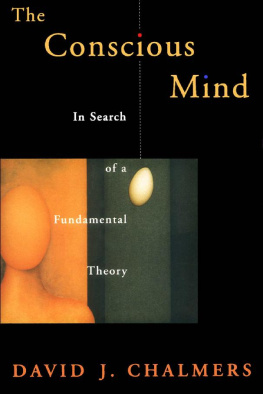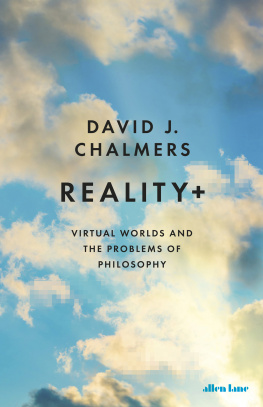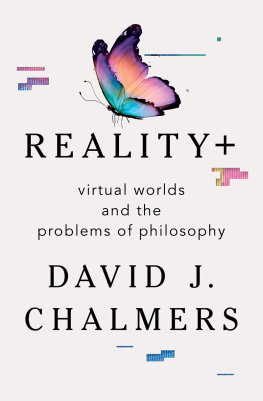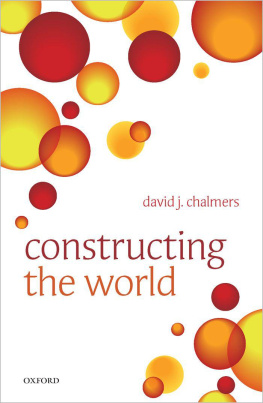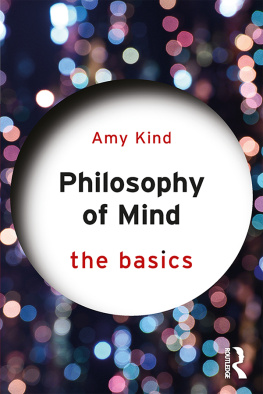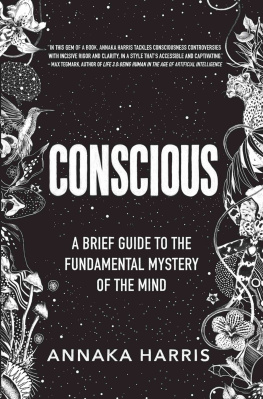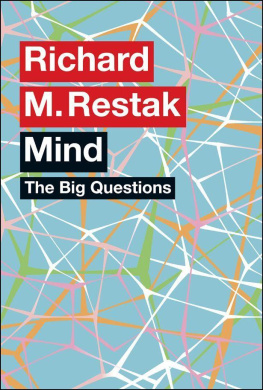David J. Chalmers - The Conscious Mind: In Search of a Fundamental Theory (Philosophy of Mind)
Here you can read online David J. Chalmers - The Conscious Mind: In Search of a Fundamental Theory (Philosophy of Mind) full text of the book (entire story) in english for free. Download pdf and epub, get meaning, cover and reviews about this ebook. year: 1996, publisher: Oxford University Press, genre: Science. Description of the work, (preface) as well as reviews are available. Best literature library LitArk.com created for fans of good reading and offers a wide selection of genres:
Romance novel
Science fiction
Adventure
Detective
Science
History
Home and family
Prose
Art
Politics
Computer
Non-fiction
Religion
Business
Children
Humor
Choose a favorite category and find really read worthwhile books. Enjoy immersion in the world of imagination, feel the emotions of the characters or learn something new for yourself, make an fascinating discovery.
- Book:The Conscious Mind: In Search of a Fundamental Theory (Philosophy of Mind)
- Author:
- Publisher:Oxford University Press
- Genre:
- Year:1996
- Rating:4 / 5
- Favourites:Add to favourites
- Your mark:
- 80
- 1
- 2
- 3
- 4
- 5
The Conscious Mind: In Search of a Fundamental Theory (Philosophy of Mind): summary, description and annotation
We offer to read an annotation, description, summary or preface (depends on what the author of the book "The Conscious Mind: In Search of a Fundamental Theory (Philosophy of Mind)" wrote himself). If you haven't found the necessary information about the book — write in the comments, we will try to find it.
The Conscious Mind: In Search of a Fundamental Theory (Philosophy of Mind) — read online for free the complete book (whole text) full work
Below is the text of the book, divided by pages. System saving the place of the last page read, allows you to conveniently read the book "The Conscious Mind: In Search of a Fundamental Theory (Philosophy of Mind)" online for free, without having to search again every time where you left off. Put a bookmark, and you can go to the page where you finished reading at any time.
Font size:
Interval:
Bookmark:
THE
Conscious
Mind
PHILOSOPHY OF MIND SERIES
Series Editor: Owen Flanagan, Duke University
SELF EXPRESSIONS
Mind, Morals, and the Meaning of Life
Owen Flanagan
DECONSTRUCTING THE MIND
Stephen P. Stich
THE CONSCIOUS MIND
In Search of a Fundamental Theory
David J. Chalmers
Conscious
Mind
IN SEARCH OF
A FUNDAMENTAL THEORY
David J. Chalmers

Oxford University Press
Oxford New York
Athens Auckland Bangkok Bogot
Bombay Buenos Aires Calcutta Cape Town
Dar es Salaam Delhi Florence Hong Kong Istanbul
Karachi Kuala Lumpur Madras Madrid Melbourne
Mexico City Nairobi Paris Singapore
Taipei Tokyo Toronto Warsaw
and associated companies in
Berlin Ibadan
Copyright 1996 by David J. Chalmers
First published by Oxford University Press, Inc., 1996
First issued as an Oxford University Press paperback, 1997
Oxford is a registered trademark of Oxford University Press
All rights reserved. No part of this publication may be reproduced,
stored in a retrieval system, or transmitted, in any form or by any means,
electronic, mechanical, photocopying, recording, or otherwise,
without the prior permission of Oxford University Press.
Library of Congress Cataloging-in-Publication Data
Chalmers, David John
The conscious mind : in search of a fundamental theory
p. cm. (Philosophy of mind series)
Includes bibliographical references and index.
ISBN 0-19-510553-2
ISBN 0-19-511789-1 (Pbk.)
1. Philosophy of mind. 2. Consciousness. 3. Mind and body.
4. Dualism. I. Title. II. Series.
BD418.3.C43 1996
128.2dc20 95-36036
9 10
Printed in the United States of America
on acid-free paper.
I first became excited by consciousness and the mindbody problem as an undergraduate studying mathematics at the University of Adelaide. Conversations with a number of people, especially Paul Barter, Jon Baxter, Ben Hambly, and Paul McCann, helped form my ideas. Even then, the subject seemed about as fascinating a problem as there could be. It seemed faintly unreasonable that somebody could be occupied full-time thinking about something that was so much fun.
Later, as a graduate student at Oxford, I found that the mind was always occupying my thoughts where mathematics should have been, and I decided to switch fields and eventually to switch continents. Many people were patient and supportive during this difficult time, especially Michael Atiyah, Michael Dummett, and Robin Fletcher. Thanks also to all those who were subjected to hearing about whatever my latest theory of consciousness happened to be; the ideas in this book are a distant descendant.
My decision to move to Indiana University to gain a grounding in philosophy, cognitive science, and artificial intelligence was one of the best that I have made. I owe special thanks to Doug Hofstadter; it was his writing that first introduced me to the mysteries of the mind when I was young, and it was the stimulating and comfortable environment of his research lab, the Center for Research on Concepts and Cognition, that allowed these ideas to develop. Although he disagrees with many of the ideas in this book, I would like to think that at some level what I have written remains true to the intellectual spirit of his work.
I wrote the first version of this work (then known as Toward a Theory of Consciousness) in a heady six-month period in 1992 and 1993. I had useful discussions with a number of people at Indiana around this time: everybody at CRCC, especially Bob French and Liane Gabora, and many in other departments, including Mike Dunn, Rob Goldstone, Anil Gupta, Jim Hettmer, Jerry Seligman, and Tim van Gelder. Thanks also to members of the consciousness discussion group in the back room at Nicks for many enjoyable Monday afternoon conversations.
A two-year McDonnell fellowship in philosophy, neuroscience, and psychology at Washington University has provided another stimulating environment, as well as a chance to experience Zenos paradox in finishing this book. I am grateful to the James S. McDonnell Foundation for their support, to all the participants in my graduate seminar on consciousness for discussions that helped to refine the book, and to a number of people for conversation and comments, including Morten Christiansen, Andy Clark, Jason Clevenger, Peggy DesAutels, Pepa Toribio, and Tad Zawidzki.
In the last couple of years, I have had an enormous amount of helpful conversation and correspondence about the material in this book. Among many others, thanks are due to Jon Baxter, Ned Block, Alex Byrne, Francis Crick, Dan Dennett, Eric Dietrich, Avi Elitzur, Matthew Elton, Owen Flanagan, Stan Franklin, Liane Gabora, Gven Gzeldere, Chris Hill, Terry Horgan, Steve Horst, Frank Jackson, Jaegwon Kim, Christof Koch, Martin Leckey, Dave Leising, Kerry Levenberg, Joe Levine, David Lewis, Barry Loewer, Bill Lycan, Paul McCann, Daryl McCullough, Brian McLaughlin, Thomas Metzinger, Robert Miller, Andrew Milne, John OLeary-Hawthorne, Joseph ORourke, Calvin Ostrum, Rhett Savage, Aaron Sloman, Leopold Stubenberg, and Red Watson. I am grateful to too many others to mention for interesting conversations about consciousness in general. A special note of thanks to Norton Nelkin, who returned his copy of the manuscript covered with many helpful comments not long before he died of lymphoma. He will be missed.
My broader philosophical debts are many. I developed my initial views on consciousness largely on my own, but these have been greatly enriched by my reading on the subject. One discovers quickly that any given idea has likely been expressed already by someone else. Among recent thinkers, Thomas Nagel, Frank Jackson, and Joseph Levine have done much to emphasize the perplexities of consciousness; their work covers much of the same territory as my early chapters. My work also overlaps with work by Ned Block, Robert Kirk, and Michael Lockwood at a number of points. The metaphysical framework that I develop in owes much to the work of Terry Horgan, Saul Kripke, and David Lewis, among others, and Frank Jackson has independently developed a similar framework, presented in his marvelous 1995 John Locke lectures. The ideas of Daniel Dennett, Colin McGinn, John Searle, and Sydney Shoemaker have provided stimulating challenges throughout.
My greatest debts are to Gregg Rosenberg, for memorable conversations and valuable feedback; to Lisa Thomas, for a book on zombies and moral support; to Sharon Wahl, for expert editing and warm friendship; and above all, to all three of my parents, for their support and encouragement. And thanks to all my qualia, and to the environment responsible for producing them, for constant inspiration.
As I was finishing this book, I received a fortune cookie in a restaurant, saying Your life will be full of delightful mysteries. So far it has been, and I am very grateful.
Taking Consciousness Seriously
C onsciousness is the biggest mystery. It may be the largest outstanding obstacle in our quest for a scientific understanding of the universe. The science of physics is not yet complete, but it is well understood; the science of biology has removed many ancient mysteries surrounding the nature of life. There are gaps in our understanding of these fields, but they do not seem intractable. We have a sense of what a solution to these problems might look like; we just need to get the details right.
Next pageFont size:
Interval:
Bookmark:
Similar books «The Conscious Mind: In Search of a Fundamental Theory (Philosophy of Mind)»
Look at similar books to The Conscious Mind: In Search of a Fundamental Theory (Philosophy of Mind). We have selected literature similar in name and meaning in the hope of providing readers with more options to find new, interesting, not yet read works.
Discussion, reviews of the book The Conscious Mind: In Search of a Fundamental Theory (Philosophy of Mind) and just readers' own opinions. Leave your comments, write what you think about the work, its meaning or the main characters. Specify what exactly you liked and what you didn't like, and why you think so.

